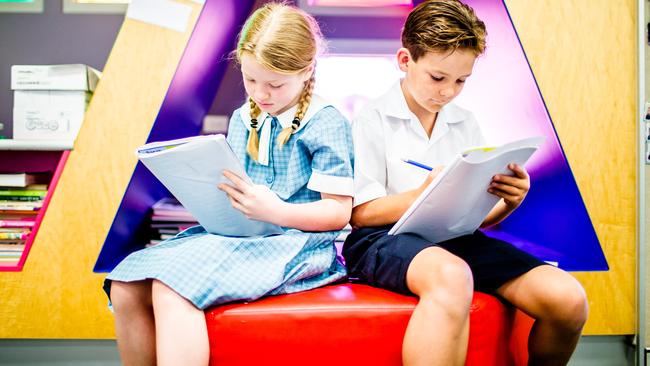AEU survey finds long delays for schools wanting help for students
Some students need extra help to thrive at school. But it takes teachers months to navigate bureaucracy to get support, a survey finds.

Education
Don't miss out on the headlines from Education. Followed categories will be added to My News.
Excessive red-tape delays and lack of funding is stopping South Australian students in need from getting the extra help their schools say they deserve, a survey has found.
Applications for help were refused in a third of cases and insufficient funding provided in more than half the times government schools asked for support from professionals such as educational psychologists, behaviour coaches and speech pathologists.
That was after schools waited months for students to be assessed and teachers typically spent five to 20 hours preparing an application.
The survey of more than 1000 teachers, school principals and leaders and support staff was conducted by the Australian Education Union among its members and non-members.
“In each classroom, on average, at least three kids need extra support to help them learn but we’re falling behind as a state in being able to support them,” AEU SA president Lara Golding said.
“In some classrooms, that number rises to almost one third of the class.
“Teachers are doing their absolute best, but their excessive workloads to make up for the shortfall are taking their toll and some students are missing out.”
Schools each receive some base funding from the Education Department to provide support services, but 95 per cent of survey respondents said this was not enough.
To draw more funding, schools must have students formally assessed by a specialist. A fifth of those surveyed said this process took more than a year, with another fifth saying it took between 9 and 12 months.
Once the specialist delivers a report, schools needed to collect data, hold meetings and fill in forms – a process which took a fifth of survey respondents more than 20 hours to complete.
“Too many children are missing out on the extra support they need to learn,” Ms Golding said.
“Classrooms are crowded. Students with extra needs aren’t being supported the way they should.”

However Education Minister John Gardner said if a child “has been identified as needing support, then they will get support”.
“There has never been more resources, more focus, or more money devoted to students who need this sort of assistance with a 25 per cent increase in funding for students with disability since we came to government,” he said.
“Whether we are talking numbers of students or the amount of funding going straight to schools, we have significantly increased the level of support to students with disability across the life of the Marshall Liberal Government.”
Education Department acting executive director for early years and child development Natalie Atkinson said work was underway to streamline the process.
“We are committed to continuing to reduce wait times for assessments,” she said.
“Wait times have been reduced over 2019-20 by mobilising support from different offices, use of outsourcing, and reviewing our service delivery models.
“Wait times can vary from site to site depending on demand and location. However, schools are still able to access funding support during waiting times.”
The department said funding for students with disability and special needs had increased to $305m last year, up from $241m in 2018.
The number of students receiving support increased to 21,116 from 16,030 in 2017.
The AEU intends campaigning for a better deal for students in the run up to the state election in March.
The Every School Every Child campaign also aims to raise funding as an issue at the federal election expected later this year or early in 2022.


